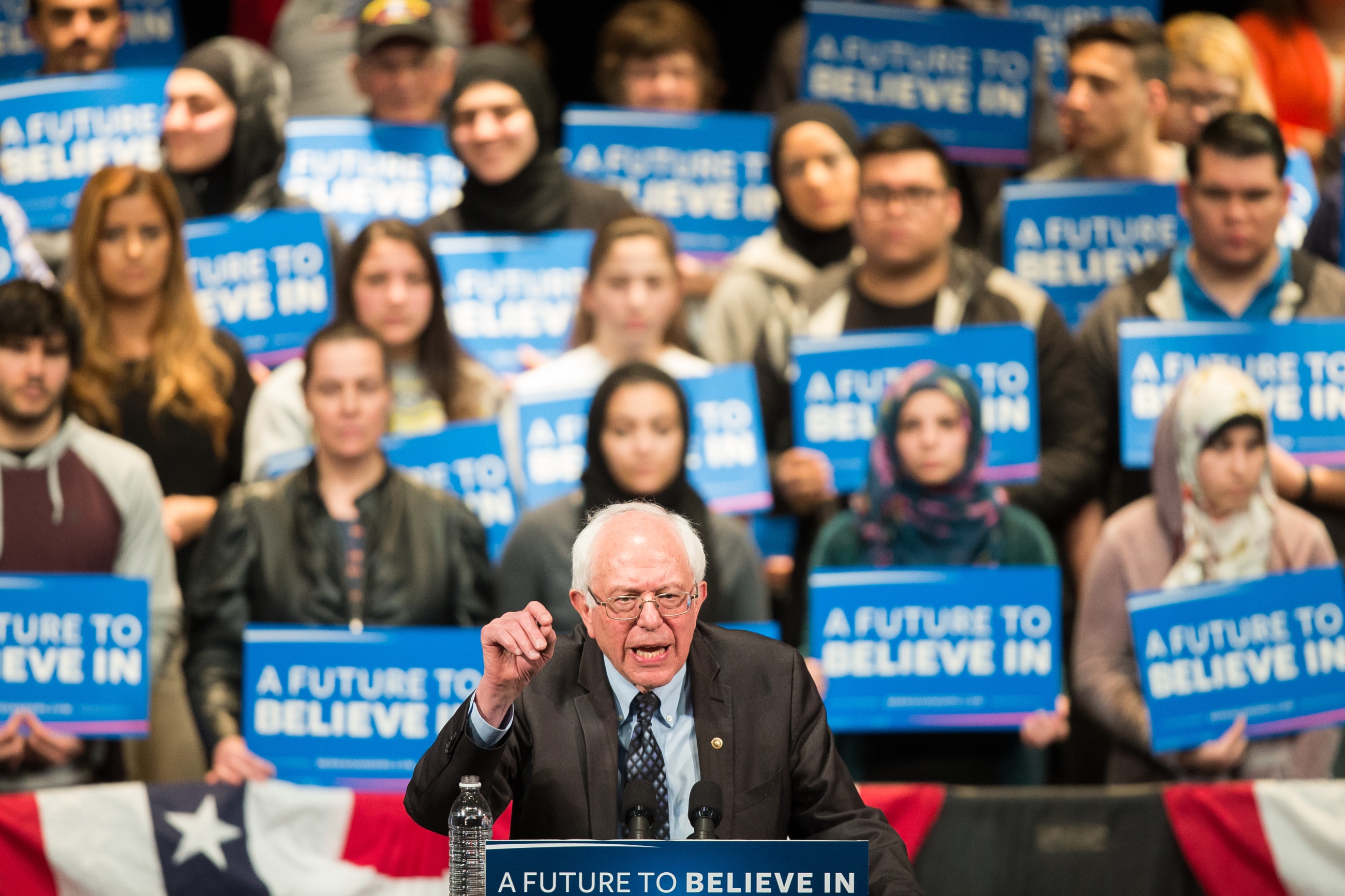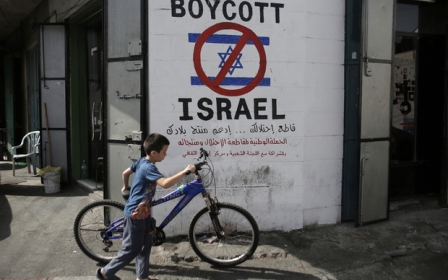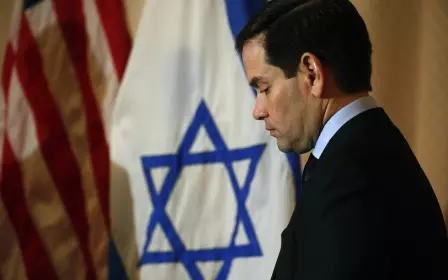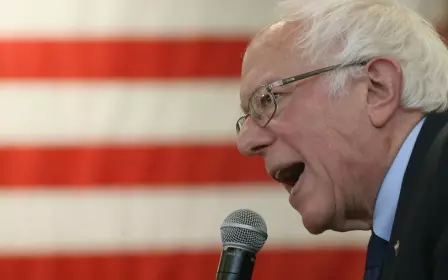Bernie 2020: Arab-American advocates show early support for Sanders

When Palestinian-American comedian and activist Amer Zahr met Bernie Sanders earlier this year, he urged the senator from Vermont, in the name of the Arab-American community, to run for president again.
"I told him: 'Our community needs you because you're the only one that we trust in this field. We need you as much as you need us,'" Zahr told Middle East Eye.
Sanders officially announced his candidacy on Tuesday, joining a crowded contest of Democrats vying to win the party's nomination and take on President Donald Trump in November 2020.
It will be the 77-year-old senator's second presidential race after he lost the 2016 primaries to Hillary Clinton.
Arab-Americans overwhelmingly backed Sanders then - and community advocates are already showing unwavering enthusiasm for the lawmaker this time around, too.
Arab-American support
Sanders already had a strong base of support among Arab-Americans in 2016 after he ran Arabic campaign ads, met with Arab activists and put forward a foreign-policy agenda that appealed to a community weary of US wars and US politicians' unquestioning backing of Israel.
In predominantly Arab neighbourhoods in Dearborn, Michigan, for example, Sanders beat out his then-primary opponent Clinton by a wide margin of votes, which helped him carry the state in one of the biggest upsets of the 2016 Democratic race.
While his campaign was focused on economic issues, the senator often slammed then-candidate Trump for his bigoted rhetoric and promoted a message of unity.
Prominent Arab and Muslim activists, including Linda Sarsour, spoke at his rallies.
On Tuesday, Sarsour suggested that she would back Sanders again, saying on Twitter that she has contributed $27 to his 2020 campaign.
That average donation - of $27 - was a theme in Sanders's 2016 campaign for president, with the modest sum highlighting his refusal to accept large amounts of money from political lobbyists and special interest groups.
Wihad al-Tawil, a graduate student of Middle Eastern studies at the University of Chicago, said Arab-Americans are drawn to Sanders partly because of his independence from lobbyists.
She said Sanders is "not beholden" to the "war industry", noting that he opposed the US-led invasion of Iraq.
Speaking in front of a mostly Arab-American audience in Dearborn three years ago, Sanders criticised US military interventions in the Middle East.
"Regime change does not always work out quite as smoothly as some people think it does," Sanders said at the time.
Over the past two years, Sanders has also led efforts in Congress to halt US support for the Saudi-led war in Yemen.
Al-Tawil, herself a Sanders supporter, said Arab-Americans' political awareness has led them to trust Sanders.
"They've been through it. They know there is a lot of corruption in government in general, and they could recognise that he wasn't one of those usual political sweet-talkers," she said.
Zahr, who served as a surrogate on Sanders' 2016 campaign, speaking at his rallies, said the senator linked his message of economic justice with racial justice. "He was never seen as a corporate, or warmongering, politician," he said.
'The only candidate we trust'
Zahr said he believed Arab-Americans would "overwhelmingly" back Sanders in next year's elections.
"In 2020, he's the only candidate who we trust, who we've seen stand up for us, who we don't have questions about. And that's very important for us," he said.
James Zogby, president of the Arab American Institute, echoed Zahr's comments about Arab-American voters valuing trustworthiness.
"I think our community has an instinct for candidates that tell the truth and that they feel they can trust," Zogby said, adding that many Arab-Americans would describe Sanders as honest and principled.
"This was a guy that they said, 'I can trust him'. And his positions on the Middle East were icing on the cake."
The community's admiration for the senator "will not change in this cycle", Zogby said.
He also said that the Arab-American vote may give Sanders an edge, especially in places like Michigan, which is home to a large Arab-American community.
However, Zogby stressed that Arab-Americans remain politically diverse. "We have a Republican component and we have a centrist Democratic component; not everybody is on the same page," he said.
Palestine
Another point that has drawn Arab-Americans to Sanders is the fact that his 2016 campaign opened up a national debate on the Palestinian-Israeli conflict, while questioning the taboo of expressing anything but unwavering support for the Israeli government in presidential politics.
"The Israelis must end the blockade of Gaza and cease developing settlements on Palestinian land," Sanders' 2016 campaign platform read.
Zahr said Sanders addressed the one issue that unites Arab-Americans: Palestine.
While acknowledging that Sanders is not chanting "free, free Palestine", Zahr said Sanders has called for equal rights and self-determination for Palestinians.
"He talks about the overuse of military force by the Israelis; he talks about the economic problems in Gaza and the West Bank. These are things that we want put out there," the comedian said.
While newly elected congresswomen Rashida Tlaib and Ilhan Omar are often portrayed as the first US lawmakers to criticise Israel, over the past two years, Sanders has regularly denounced Israeli policies, including plans to demolish the Palestinian village of Khan al-Ahmar in the occupied West Bank and the deadly crackdown on protesters in Gaza.
Sanders has also been outspoken in rejecting US legislative proposals that seek to legally restrict the Boycott, Divestment and Sanctions (BDS) movement, which aims to pressure Israel economically and politically to end its abuses against Palestinians.
But perhaps his most memorable support for Palestinians came during a 2016 debate with Clinton ahead of the decisive New York primaries, in which he rebuked Washington's one-sided approach to the conflict.
"In the long run, if we are ever going to bring peace to that region which has seen so much hatred and so much war, we are going to have to treat the Palestinian people with respect and dignity," he said at the time.
The senator went on to denounce Clinton for failing to speak about Palestinians during a speech at a conference for the American Israel Public Affairs Committee (AIPAC), which he had boycotted a few weeks earlier.
"There comes a time when if we pursue justice and peace, we are going to have to say that [Israeli Prime Minister Benjamin] Netanyahu is not right all of the time," he told his then-Democratic opponent.
Al-Tawil, the student and Sanders supporter, credits the senator with helping to normalise criticism of Israel in US politics.
"He made it a mainstream issue," she said. "Before Bernie Sanders, I think it was off-limit or taboo to speak out against Israeli atrocities against Palestinians."
Zogby said there is a "dialectic relationship" between the rise of Sanders and Democratic voters' shift on Israel.
He said Democrats, particularly young people and members of minority communities, were already starting to view Palestinians more favourably and opposing the practices of the Israeli government.
"Bernie was the midwife who helped bring it forth, but it already was there," he said.
Middle East Eye propose une couverture et une analyse indépendantes et incomparables du Moyen-Orient, de l’Afrique du Nord et d’autres régions du monde. Pour en savoir plus sur la reprise de ce contenu et les frais qui s’appliquent, veuillez remplir ce formulaire [en anglais]. Pour en savoir plus sur MEE, cliquez ici [en anglais].




